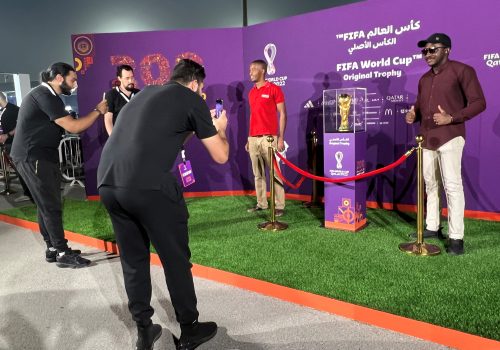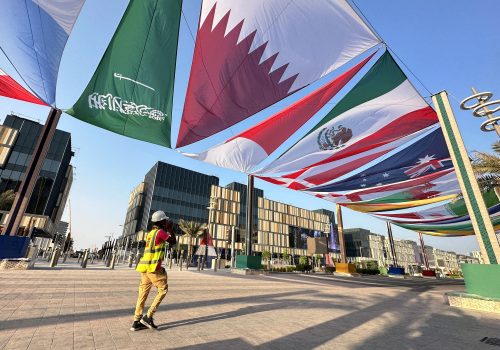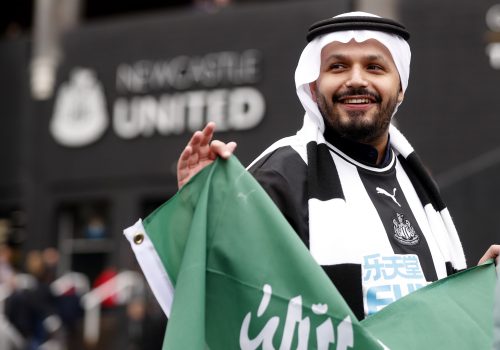Saudi Arabia lost at the 2022 World Cup. But its sports sector is winning.
The Saudi Arabia versus Argentina match during the 2022 World Cup resulted in one of the biggest upsets in Argentina’s history, with the two-time champions experiencing its first defeat in thirty-six matches. The day of the November 22 match, Saudi ministries, government agencies, schools, and universities were directed to end working hours early so that people could watch the game. After Saudi Arabia’s victory, King Salman declared the next day a national holiday.
The Saudi victory brought euphoria not just to Saudis but also the entire region, with social media users from other Arab countries sharing videos of their reactions to the Saudi national team victory. As journalist Sarah Dadouch put it: “The Arab world in particular witnessed a rare moment of shared ecstasy.”
The outcome of the game was not a coincidence. As Saudi Sports Minister Prince Abdulaziz Bin Turki Al Faisal stated, the team had been preparing for that moment for three years. The ministry’s significant efforts to promote and support soccer reflects its overall direction and goals.
The sports sector is one of the vital pillars of Saudi Vision 2030 and the Ministry of Sport’s dedication is tangible in Saudi Arabia, where one can witness the enhanced facilities and increased citizen participation in sports. This change did not occur overnight, and it is partly the result of the widespread public support for sports and entertainment and a desire to compete at the international level.
Implications for the Kingdom
As part of Crown Prince Mohammed bin Salman’s Vision 2030, Saudi Arabia prioritized sports in 2016. Since then, Saudi Arabia’s sports industry has undergone major reforms led by three key goals: increasing community engagement in sports by 40 percent by 2030, improving Saudi elite athletes’ performances abroad, and boosting the sports economy.
Today, sports are indeed gaining center stage in the Kingdom’s ongoing effort to diversify its economy away from hydrocarbons and toward different industries. One of the goals of Vision 2030 was to make the Kingdom a regional center for top professional sporting events, which will have crucial implications for the country, such as job creation. According to the 2020 Ministry of Sport report, the sports sector created more than fourteen thousand jobs that year. Moreover, jobs at sports clubs have increased in three years by 129 percent due to new sports offerings. Between 2018 and 2021, administrative jobs rose by 156 percent, while career opportunities in sports rose by more than 114 percent.
The economic impact of tourism is another key benefit of hosting sporting events in the Kingdom, as these events contribute to an increased number of foreign visitors from all over the world who can spend money and boost the Saudi economy. According to the ministry, sporting events in 2020 have generated 36.9 million Saudi riyals ($9.8 million) in ticketing revenue and visitor spending. Furthermore, the sports sector generally contributes to hotel spending and the hospitality industry. Riyadh’s hotel occupancy rates increased by 58 percent in the first eight months of 2022 and Jeddah’s occupancy rate was 52 percent, up almost 13 percent from last year in part due to the pandemic. Both Jeddah and Riyadh hosted events during the first eight months of 2022, such as Formula E, Formula 1, and Rage on the Red Sea. The occupancy numbers will likely keep increasing as the country opens up for major sporting tournaments.
Sports have the power to unite people all over the world. Thus, opening up the country and fostering sports achievements and fan support have economic implications for the Kingdom and are also crucial for soft power in terms of international bridge-building. Saudi Arabia was a closed country for many years and did not encourage much tourism or international visitors, which resulted in misconceptions about its culture. Letting people in and giving them the opportunity to experience the country firsthand are critical for setting the record straight.
More opportunities created
One of Saudi Arabia’s biggest hurdles in promoting sports was the low participation of women. Top-down reforms have helped address this problem. In 2018, families—not just male attendees—were permitted to enter stadiums. Attendees at athletic events rose by 152 percent following this change. To encourage women’s involvement in sports, the Ministry of Education issued a decision in 2017 to implement sports classes in girls’ schools, which public schools lacked in the past. All these reforms helped skyrocket women’s participation in sports by 150 percent from 2015 to 2019. Today, the Kingdom has more than six thousand female athletes and twenty-seven women’s sports teams.
Additionally, to create the right infrastructure, the Saudi Ministry of Sport also facilitates services and provides opportunities. One such service to develop the Saudi sports industry is a platform called Nafes, which was created in 2021 to help streamline the licensing processes for private sector clubs. Today, 30 percent of private clubs and academies are specifically for women. In terms of providing opportunities, the Mahd Sports Academy was established to discover and develop talents from a young age in all Saudi regions and cities to form a group of sports champions over a ten-year period. Supporting homegrown Saudi talent and offering them world-class coaching and guidance from a very young age underscores the country’s desire to excel in the industry.
Another important element is Sports Minister Prince Abdulaziz’s role in fostering Saudi interest in sports, given his huge support of the country’s athletes. Prince Abdulaziz, who has an athletic background and is well respected, is part of the Kingdom’s young leadership. He is highly active on social media, with more than 650k followers on Twitter and more than 260k Instagram followers. The minister shares personal videos of himself, such as the one showing him working out at home during the pandemic or another displaying his tennis skills.
Many Saudi athletes have shared pictures and videos on social media of Prince Abdulaziz giving advice to athletes, attending their practices, and cheering for them. Further, when the ministry announces initiatives, such as walks for charity, the minister is often on the ground and participating with citizens. This kind of dedicated leadership and commitment reflects the new governmental approach to interacting with its young population, which is critical, since 70 percent of the Kingdom is under the age of thirty. The minister was also recognized by Crown Prince Mohamed in a widely shared interview, which affected how Saudis see the sports sector as well as the minister. This was also showcased when many Saudis shared a viral Twitter video with the caption, “the secret of the national team victory,” referring to the sports minister after Saudi Arabia won against Argentina.
Moreover, the ministry has large budgets for sports, as evidenced by the first-ever Saudi Games event, in which participants were competing for a grand total of more than 200 million Saudi riyals ($53 million). The Saudi Games were the biggest national sporting event in Saudi Arabia’s history. More than six thousand participants representing over two hundred clubs throughout the Kingdom competed in forty-five individual and team sports in Riyadh in 2022, including five Paralympic sports. The gold medal winners received 1 million Saudi riyals ($266,600) while the silver and bronze medal winners earned 300,000 Saudi riyals ($80,000) and 100,000 Saudi riyals ($26,600), respectively. This prize is the largest amount ever allocated to the sports industry in the region’s history.
Opening up the borders but keeping the Saudi culture strong
Organizing a large-scale sporting event requires robust tourism and entertainment attractions for visitors. When Saudi Arabia announced the hosting of the Formula E electric car race in 2018, it was the first Formula E race to be held in the Middle East. This was a challenge at the time because Saudi Arabia had strict border entry rules and, in order to host a global event such as Formula E, it needed to welcome global viewers. As a result, Saudi Arabia offered tourist visas for the first time in its history. The event’s success paved the way for the country to open its borders to tourists and create an online visa process in late 2019.
One concern over the years has been that Saudi Arabia might lose its national identity if it opened up too quickly. However, this has not been the case. For the Formula E race, the Saudi leadership specifically chose to host the event at the ancient historical city of Diriyah, the first seat of power for the Saudi monarchy. During the 2021 Dakar Rally, a video of a group of Bedouins in the desert doing a traditional welcome dance for the rally participants went viral, as well as a video of participants gathering around camels. The Bedouins even hosted visitors for coffee in the middle of the road.
The “Saudi Cup” horse race was another significant event. With the cooperation of the Ministry of Culture and the Fashion Commission, a dress code was issued for the “Saudi Cup” event in order to highlight local culture and enhance national heritage at major international events. The guide aimed to showcase outfits for men and women inspired by traditional Saudi costumes. Selecting historical places to host events, issuing traditional dress codes, and promoting videos of Saudi values are all efforts to celebrate Saudi identity.
Although Saudi Arabia is officially out of the 2022 World Cup after the defeat to Mexico on November 30, the World Cup has clearly showcased the development in facilities and the governmental approach to celebrating Saudi National identity. In the past, Saudis watched the World Cup at home in a family setting. Now, the government and the private sector have designed facilities with giant screens to allow all members of society to publicly and collectively support the national team. The atmosphere in Saudi Arabia between the first match on November 22 and the final match on November 30 was almost like a week-long Saudi National day. The public waved Saudi flags and wore Saudi t-shirts and Saudi national songs played in restaurants, malls, and coffee shops.
Saudi Arabia and its Ministry of Sport have met major milestones in supporting young talent, increasing women’s participation, and incubating international sporting events while preserving Saudi culture. Furthermore, Saudi Arabia is building the necessary infrastructure to equip its people to compete globally and host global sporting events. In fact, Saudi Arabia submitted a bid to host the Asian Football Confederation Women’s Asian Cup in 2026 and the 2027 Asian Cup. Some media outlets have also reported that Saudi Arabia is preparing to apply to host the 2030 World Cup.
Time will tell if Saudi Arabia will become the second Arab country to host the World Cup. Regardless of the outcome, Saudi Arabia is making steady progress in developing its sports industry.
Lujain Alotaibi is a project coordinator at King Faisal Center for Research and Islamic Studies. Follow her on Twitter: @LM_Otaibi.
Further reading
Fri, May 6, 2022
Can soccer plead ignorance? A World Cup of politics is brewing for Qatar 2022.
MENASource By Joze Pelayo, Hamad Abbas
The integration of politics with the World Cup goes beyond the Russian invasion, as the choice of Qatar as the host nation invited significant backlash.
Tue, Oct 25, 2022
The 2022 FIFA World Cup is less than a month away. Qatar’s supposed labor reforms have done little to improve worker’s conditions.
MENASource By
The workers responsible for making this event happen continue to face death and abuse each day, while risking deportation if they protest.
Mon, Apr 4, 2022
Many European soccer teams are owned by Gulf states. But why?
MENASource By Hezha Barzani
With a lucrative and rapidly growing European soccer market, it’s safe to say that Gulf nations will continue to invest in the beautiful game and reap benefits economically and socially.
Image: Soccer Football - FIFA World Cup Qatar 2022 - Fans in Souq Waqif - Doha, Qatar - December 1, 2022 Fans celebrate and carry the flag of Saudi Arabia after the Canada v Morocco match as Morocco qualify for the knockout stages REUTERS/Amr Abdallah Dalsh


